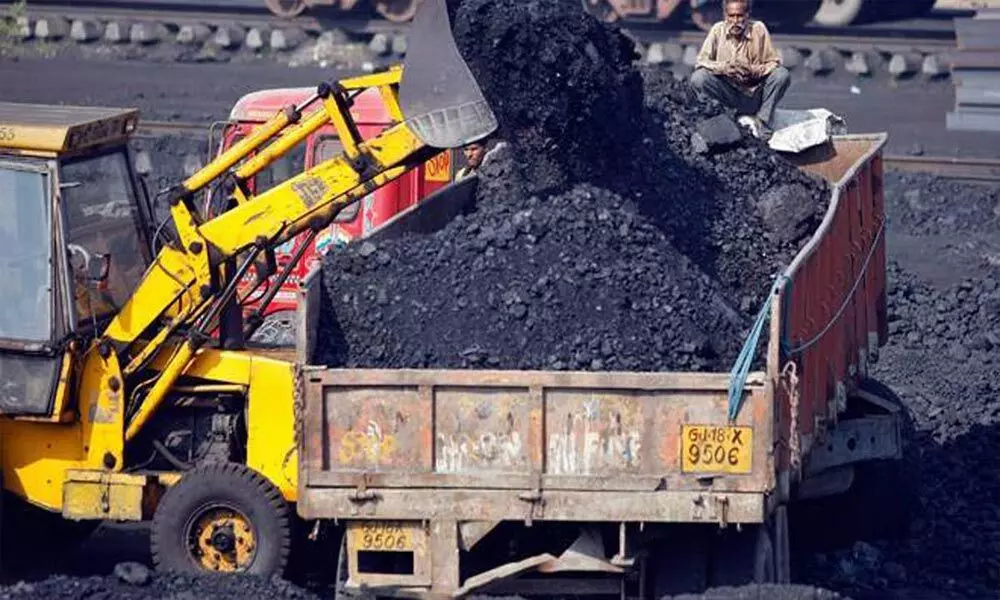Coal supply bottlenecks, soaring crude prices could dent economic recovery
India has been hit by an unprecedented energy crisis in the past few weeks
image for illustrative purpose

India has been hit by an unprecedented energy crisis in the past few weeks. Coal availability is falling short of demand by thermal power generating plants while soaring world oil and gas prices look set to push up costs across the board. The double whammy has come at a time when the economy is in recovery mode after the second Covid wave. Many indicators are showing positive growth right now including tax collections and exports. But the entire apple cart could be upset if coal shortages lead to disruptions in power supply to key industrial sectors. Similarly, higher prices for crude oil purchases will have an equally adverse impact as rising fuel costs create inflationary pressures on the economy.
The coal supply crisis seems to have had its genesis in a slowdown in output by the premier producer, public sector Coal India Limited over the past few years. There are reportedly several reasons for the lag in output. One has been the failure to quickly replace chief executives in both the holding company and subsidiaries. The resulting lack of top level policy directions is said to have slowed down operations. Another factor could be the policy focus on renewables and hence a perception that coal availability need not be stepped up as in the past.
The issue is mired in controversy as Power Minister RK Singh has been insisting that there is no shortfall in coal supplies. But several states have been reporting that thermal plants are down to just a few days stocks and power outages are occurring in many places. So far the situation has remained at the precarious level but rearguard action on stepping up supplies seems to have contained the crisis for the time being. Latest official data shows that the number of non-pithead plants with less than four days coal stocks has fallen from 70 to 61, indicating that supplies are being stepped up.
As for oil, the issue is not availability but the rising cost of buying it from abroad. Prices of the benchmark Brent crude have touched 85 dollars per barrel, a peak last reached in 2018. The firming up of crude prices has followed the spike in natural gas prices in recent months. The latter has risen due to a combination of factors including higher demand following the receding of the pandemic in many parts of the world.
But it is also a consequence of lower oil and gas drilling owing to depressed demand last year which in turn led down to a drawdown in inventories especially in Europe. The spurt in gas prices has meant that some sectors including power and fertilizers all over the world have been facing restricted feedstock availability. The situation is easing slightly now as exports of liquefied natural gas (LNG) from the US are picking up and gas prices are slowly softening
Crude oil prices, however, are continuing to harden as demand picks up globally with economies rapidly returning to normalcy. The high prices had originally been pushed due to several hurricanes in the Gulf of Mexico that curtailed output from offshore areas.
In addition, OPEC plus or the oil cartel OPEC along with its allies led by Russia, had fixed a level of 400000 barrels per day as increase in output from September onwards, ostensibly to meet the surge in world demand. But this has not been enough to meet the needs of burgeoning international economies while heating demand has now arisen as well with the onset of colder weather.
The rapid rise in oil prices has caused concern in this country which has rightly reached out to its long term suppliers in West Asia to seek a moderation of prices. India is joining hands with another major oil importer, Japan, to urge oil producers to raise output and thus stabilize the market. It has also warned OPEC plus that a slowdown in economic activity owing to high oil and gas prices could be counter-productive by ultimately curbing demand. At an international energy conference Petroleum Minister Hardeep Puri cautioned that high oil prices could lead to a surge in inflation and thereby increase the costs of producing and transporting goods.
Energy availability and pricing is thus facing a crisis just as the economy seems to be on the threshold of a firm revival. All efforts to bring about a broad-based recovery could be hampered by power shortages and high fuel prices. In the case of the former, there is much within the government's control.
It needs to increase coal output on a war footing to meet the short-term needs. Any governance issues at public sector coal companies need to be resolved without any delay. Jharkhand, Bihar and Rajasthan were among the states facing power shortages ranging from 6 to 24 per cent in the first week of October, while other more industrialized states like Gujarat and Haryana also faced more outages than usual. On the plus side, reports indicate there is already some improvement in coal stocks but the situation needs faster resolution.
As far as oil is concerned, however, there is little that the government can do barring trying to improve oil conservation which is a long term issue. In case the overheated oil market does not subside, the oil import bill is going to prove a heavy burden for the exchequer. On the retail side, the burden is increasingly on consumers with petrol and diesel rates having reached record levels. The cascading inflationary impact especially due to enhanced transport rates is also a source of worry.

